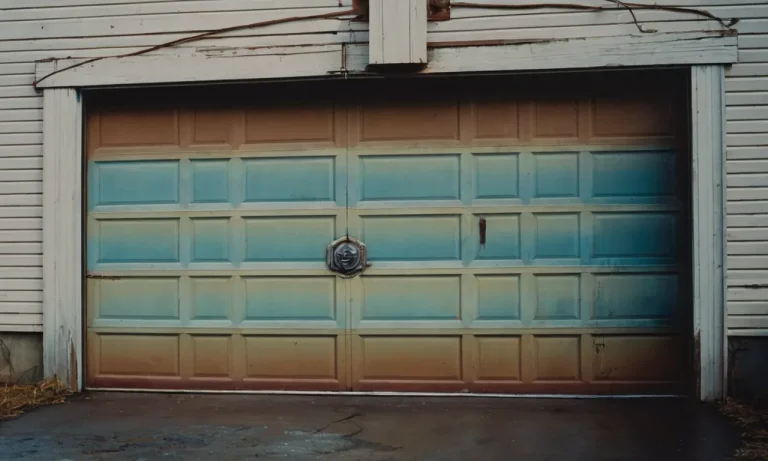Why Do My Brakes Go All The Way To The Floor?
The brakes are one of the most important safety components in your vehicle. When you press on the brake pedal, you expect it to stop the car quickly and effectively. So if you find that your brake pedal goes all the way to the floor when you press on it, it’s time to take action.
If you’re short on time, here’s a quick answer to your question: Your brakes go to the floor because you’ve likely lost brake fluid, have air in the lines, or have worn brake pads or rotors. You’ll need to inspect the brake system to find the exact cause and repair it before driving the vehicle.
Causes of Brakes Going to the Floor
Loss of Brake Fluid
One of the most common reasons why brakes go all the way to the floor is a loss of brake fluid. Brake fluid plays a crucial role in the braking system by transferring the force from the brake pedal to the brake calipers, which then press the brake pads against the rotors to slow down or stop the vehicle.
If there is a leak in the brake system or if the brake fluid level is low, it can result in a loss of hydraulic pressure, causing the brakes to go to the floor.
A common sign of a brake fluid loss is a soft or spongy brake pedal that goes all the way to the floor when applied. It’s important to address this issue promptly as driving with a compromised brake system can be extremely dangerous.
If you suspect a brake fluid leak, it is recommended to have your vehicle inspected by a qualified mechanic to identify and fix the source of the leak.
Air in the Brake Lines
Another possible cause of brakes going to the floor is the presence of air in the brake lines. Air can enter the brake system during repairs or maintenance procedures that involve opening the brake lines, such as replacing brake pads or bleeding the brakes.
When air is present in the brake lines, it compresses more easily than brake fluid, resulting in a loss of hydraulic pressure and a soft brake pedal.
To resolve this issue, a process called “bleeding the brakes” must be performed. This involves removing the air from the brake lines by opening the bleeder valves on each brake caliper and allowing fresh brake fluid to flow through the system.
It is recommended to have this procedure done by a professional, as improper bleeding can lead to further complications or a compromised brake system.
Worn Brake Pads
Worn brake pads can also contribute to the brakes going all the way to the floor. Brake pads are designed to grip the rotors and create the necessary friction to slow down or stop the vehicle. Over time, brake pads wear down and become thinner, reducing their effectiveness in generating friction.
When brake pads are excessively worn, they require more pedal travel to make contact with the rotors, resulting in a spongy brake pedal that goes to the floor. If you notice a significant decrease in braking performance or if your brake pads are worn close to their minimum thickness, it is important to have them replaced as soon as possible to ensure your safety on the road.
Warped Brake Rotors
Warped brake rotors can also be a culprit behind brakes going to the floor. Brake rotors are the flat, disc-shaped components that the brake pads press against to slow down the vehicle. Over time, heat and wear can cause the brake rotors to become uneven or warped, resulting in an inconsistent contact between the brake pads and the rotors.
When the brake rotors are warped, it can lead to a pulsating or vibrating sensation when applying the brakes, as well as a soft brake pedal that goes all the way to the floor. If you suspect that your brake rotors are warped, it is important to have them inspected and potentially replaced to restore proper braking performance.
Dangers of Driving with Brakes to the Floor
Having your brakes go all the way to the floor can be a frightening experience for any driver. Not only is it a sign of a potential brake failure, but it also poses several dangers on the road. Understanding these dangers is crucial for your safety and the safety of others.
1. Longer Stopping Distance
One of the immediate dangers of driving with brakes that go all the way to the floor is the increased stopping distance. When you press the brake pedal, the brake fluid should transmit the force to the brake calipers, which then apply pressure to the brake pads or shoes to slow down or stop the vehicle.
However, if the brakes are not functioning properly and the pedal goes all the way to the floor, it indicates a loss of hydraulic pressure. This loss of pressure reduces the effectiveness of the brakes, resulting in a longer stopping distance.
This can be especially dangerous in emergency situations where you need to stop quickly to avoid a collision.
2. Complete Brake Failure
Another significant danger of driving with brakes that go all the way to the floor is the potential for complete brake failure. If the loss of hydraulic pressure is severe enough, the brakes may not function at all.
This means that you will have no way to slow down or stop the vehicle, putting you and others on the road in immediate danger. Complete brake failure can lead to serious accidents and injuries, making it vital to address the issue as soon as possible.
3. Damage to Brake Components
Driving with brakes to the floor can also cause damage to the brake components. When the brakes are not functioning properly, it puts additional stress on other parts of the braking system, such as the master cylinder, brake lines, and calipers.
Over time, this increased stress can lead to wear and tear, resulting in costly repairs or even the need for a complete brake system replacement. It is important to address brake issues promptly to minimize the risk of further damage and expenses.
Inspecting the Brake System
When your brakes go all the way to the floor, it’s essential to inspect the brake system to identify the underlying cause. Several factors can contribute to this issue, ranging from low brake fluid levels to worn-out brake pads.
By conducting a thorough inspection, you can pinpoint the problem and take the necessary steps to fix it.
Check Brake Fluid Level and Leaks
One of the first things you should do when your brakes feel spongy is to check the brake fluid level. Low brake fluid can cause the brakes to go all the way to the floor. Locate the brake fluid reservoir under the hood of your vehicle and check if the level is below the recommended mark.
If it is low, you may need to add more brake fluid.
Additionally, inspect the brake lines and connections for any signs of leaks. Leaking brake fluid can lead to a loss of pressure in the brake system, resulting in a soft brake pedal. Look for wet spots or puddles underneath the vehicle, which may indicate a leak.
If you notice a leak, it’s crucial to address it promptly to prevent further damage.
Look for External Leaks
External leaks can occur in the brake system, causing a loss of pressure and a soft brake pedal. Inspect the brake lines, calipers, and wheel cylinders for any signs of leakage. If you notice fluid seeping out or dripping, it is a clear indication of an external leak.
External leaks can be caused by damaged brake lines, worn-out seals, or faulty calipers. It is necessary to replace or repair the affected components to restore the braking performance.
Test for Air in the Lines
Air in the brake lines can also cause the brakes to go all the way to the floor. Air bubbles in the brake fluid can compress, leading to a loss of pressure. To test for air in the lines, you can perform a brake bleed procedure.
This process involves removing the air from the brake system by opening the bleeder valves and allowing the brake fluid to flow out. It is recommended to consult the vehicle’s manual or seek professional assistance to ensure the proper execution of the brake bleed procedure.
Inspect Brake Pads and Rotors
Worn-out brake pads and rotors can contribute to a soft brake pedal. Over time, brake pads wear down, reducing their ability to generate friction and slow down the vehicle effectively. Similarly, worn-out rotors can result in insufficient contact with the brake pads, leading to a decrease in braking performance.
Inspect the brake pads and rotors for signs of wear, such as uneven surfaces or thinning brake pads. If necessary, replace the brake pads and resurface or replace the rotors to restore optimal braking.
Regular inspection and maintenance of the brake system are crucial for ensuring your safety on the road. If you are unsure about inspecting or repairing the brake system yourself, it is always recommended to consult a professional mechanic.
They have the expertise and tools to diagnose and fix any issues with your brakes, ensuring reliable and responsive braking performance.
Repairing Brakes that Go to the Floor
Having brakes that go all the way to the floor can be a frightening experience, as it compromises the safety of both the driver and passengers. This issue can occur due to various reasons, such as low brake fluid levels, air in the brake lines, worn-out brake pads and rotors, or even a malfunctioning brake master cylinder.
Fortunately, there are several steps you can take to address this problem and ensure your brakes are functioning properly.
Refill Brake Fluid
One common cause of brakes going all the way to the floor is low brake fluid levels. Brake fluid plays a crucial role in transmitting the force from your foot on the brake pedal to the brake calipers, which then apply pressure to the brake pads.
If the brake fluid is too low, there may not be enough hydraulic pressure to engage the brakes fully. To fix this issue, check the brake fluid reservoir and refill it if necessary. It’s essential to use the correct type of brake fluid recommended by your vehicle’s manufacturer.
Bleed the Brake Lines
If low brake fluid levels are not the issue, the next step is to bleed the brake lines. Air bubbles in the brake lines can cause a spongy brake pedal and reduced braking performance. Bleeding the brake lines involves removing the air bubbles by systematically purging the old brake fluid and replacing it with fresh fluid.
This process requires a specific technique and may vary depending on your vehicle’s make and model. It is recommended to consult your vehicle’s owner manual or seek assistance from a professional mechanic.
Replace Brake Pads and Rotors
Worn-out brake pads and rotors can also contribute to the problem of brakes going to the floor. Over time, brake pads wear down and lose their effectiveness, while rotors can become warped or damaged. These issues can lead to a loss of braking power and a longer stopping distance.
If you notice that your brake pads are worn or your rotors are damaged, it is crucial to replace them promptly. Consult your vehicle’s manual or seek professional help to ensure you choose the correct brake pads and rotors for your specific vehicle.
Take to a Mechanic for Repairs
If you have tried refilling the brake fluid, bleeding the brake lines, and replacing the brake pads and rotors, but the problem persists, it is advisable to take your vehicle to a mechanic for further inspection and repairs.
A professional mechanic will have the necessary knowledge and tools to diagnose and fix more complex issues with your braking system, such as a malfunctioning brake master cylinder or a leak in the brake lines.
Remember, the safety of yourself and others on the road should always be a top priority. If you experience any issues with your brakes, it is best to address them immediately to ensure your vehicle is safe to drive.
Regular maintenance and inspections of your braking system can help prevent more severe issues from occurring in the future.
Conclusion
Having your brake pedal go to the floor is a serious issue that needs immediate attention. Driving with defective brakes can lead to longer stopping distances, complete brake failure, and costly damage to the system.
Inspect your brake fluid levels, lines, pads, and rotors thoroughly to determine the cause. From there, you can refill fluid, bleed air, or replace worn parts as needed to get your brakes working properly again. Don’t delay repairs, as brakes are essential for keeping you safe on the road.







